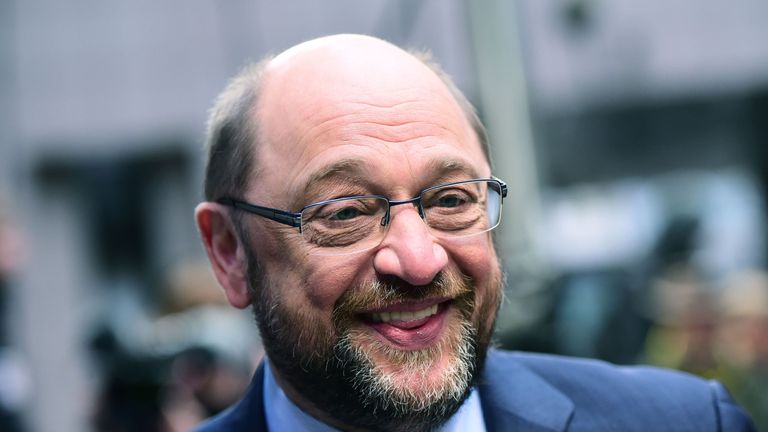Angela Merkel's economic hurdles in 2017 election race
As Germany reports a spurt of economic growth, Sky's Ian King examines the domestic hurdles to the re-election of Angela Merkel.
Friday 12 May 2017 13:37, UK
Two months ago, things did not look great for Angela Merkel.
With a general election due on 24 September, the German Chancellor was badly lagging in the polls behind her SPD rival, Martin Schulz.
Today, though, Mrs Merkel can feel more optimistic about extending her chancellorship into a fourth term.
The SPD was unexpectedly battered in last weekend's regional elections in the northern state of Schleswig-Holstein and goes into this Sunday's poll in North Rhine-Westphalia, Germany's most populous state, with its morale flagging.
And the chancellor, who will complete her campaigning in the state with a rally in Mr Schulz's home town of Aachen, received a further boost today with news that the German economy grew by 0.6% during the first three months of the year.
That was up from 0.4% during the final three months of last year and represented the strongest quarterly growth since the 0.7% notched up in the first three months of last year.
It translates to an annualised growth rate of 2.4%, better than the rest of the G7 economies, apart from Canada. It is certainly better than most of the rest of the eurozone, apart from Spain, whose economy grew by 0.8% during the period.
The German statistical office, which publishes the figures, did not provide much more detail but part of the increase looks to have been due to some unexpectedly mild weather, which boosted activity in the construction sector, while industrial production, despite slowing unexpectedly during March, enjoyed a solid quarter thanks to strong growth during January and February.
There was also a positive contribution from trade, with exports growing by more than imports. Investment in machinery and equipment by businesses was particularly strong.
That is not the only good news for Europe's biggest economy. On Thursday, the German government published official estimates suggesting that tax revenues are going to be €54.1bn stronger than expected during the next five years, indicating plenty of scope for tax cuts in coming years.
Mrs Merkel and her finance minister, Wolfgang Schauble, have already promised some €15bn worth of tax cuts for low and middle income earners should they win the election in September.
The question is whether this is as good as it gets for Germany. At the moment, the economy is firing on all cylinders, thanks to low unemployment, relatively low oil prices and, thanks to the relative weakness of the euro against the US dollar and the Japanese yen, an exchange rate that makes Germany's exports competitively priced.
There are questions over whether Germany's lack of investment in infrastructure during the last decade, which has lagged that of the OECD average, may start to impact on the country's economic performance.
Another concern is inflation, something that exerts a grip on the psychology of German consumers more than in most countries, which stands at its highest level in four years. Interest rates in the eurozone remain at ultra-low levels which may well be good for the likes of Italy but, for Germany, are inappropriate.
The grip already being exerted by inflation on the mindset of German households means that consumer spending is unlikely to have made that much of a contribution to growth in the first quarter.
To that end, a rise in wages would help. The European Commission is forecasting that unemployment will drop to just 3.9% next year, as close to full employment as it comes, which would be the lowest level since the fall of the Berlin Wall 27 years ago that heralded Germany's reunification.
That tightness in the labour market might yet translate into higher earnings growth and, with it, higher consumer spending - but that is by no means guaranteed, given that Germany has in the last couple of years welcomed in a million refugees, many of whom are now looking for work.
Perhaps the biggest question mark, though, concerns trade. Growing protectionism sparked by Donald Trump could hit exports to the US, while concerns over the direction of Brexit negotiations might also hit consumer spending in the UK, another major customer for Germany's mighty export machine.
As Tomasz Wieladek, an economist at Barclays, notes: "German growth remains overly reliant on external demand. A possible rise in protectionism and a slowdown in global trade, owing to either weaker-than-expected performance in China, the UK or the US, could therefore pose a risk to the German economy."
Not that these possible clouds on the horizon should trouble Mrs Merkel too unduly as she heads into Sunday's regional election.
North Rhine-Westphalia, often regarded as Germany's rustbelt, has gone through some difficult times during the last few years and the SPD's state government is defending a patchy record.
Win it and she can feel confident about another four years in the Bundeskanzleramt.






